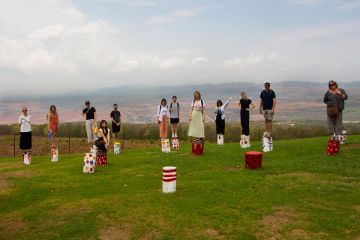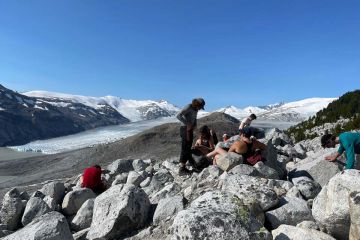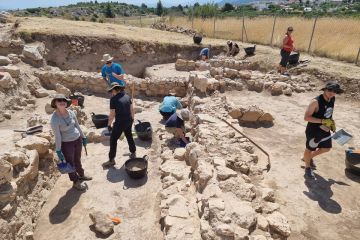India field school spotlights intergenerational theatre
- John Threlfall

The buildings may have been repaired, but two key segments of the population in the southeastern coastal region of India are still struggling to overcome the effects of the 2006 tsunami: seniors and rural youth. Now, a new UVic field school hopes to bring a sense of joy to these marginalized people by creating India’s first intergenerational theatre company.
Led by PhD candidate Matthew Gusul, 13 Department of Theatre students will be traveling to Tamil Nadu and Pondicherry, India, to participate in the two-month field school. Gusul, an applied theatre practitioner who has done similar fieldwork in Mexico and Guatemala, has been working with the 80 people in Tamil Nadu’s Tamaraikulam Elders' Village (TEV) for the past two years. By positively highlighting the life experiences of TEV residents and the 750 young students of the Isha Vidhya Matriculation School—both of which were created after the 2006 tsunami to address issues of displacement and vulnerability—Gusul will work with a team of Indian directors to encourage these seniors and rural youth to perform their own stories, develop strong community relations and create new lines of dialogue across generations.
Bringing vulnerable populations together
Many of the seniors at TEV were alive at the time of India’s independence in 1947 and offer rare opportunities for living history. But the idea of meeting the needs of seniors is still relatively new in India; in 1947, life expectancy was about 42 years, while today it’s closer to 64.
“India has a new population they don’t know how to deal with—they don’t have old age pensions or facilities for seniors,” says Gusul. “And when disasters happen, seniors are the last in the pecking order of importance. Often seniors tend to get put off to the side in what are commonly referred to as ‘granny dumps.’”
Intergenerational Theatre for Development is one example of the kind of community-engaged research happening at UVic, where undergraduates have the opportunity to take dynamic hands-on learning experiences beyond the traditional classroom and into communities around the world. “Our students are there to bear witness to the process of getting this company up and running and creating the first performance,” says Gusul. He is working with the NGO HelpAge India, which will act as the organizational home for the theatre company. Once Gusul and his students arrive, the company will begin rehearsing with intergenerational theatre techniques used by the GeriActors and Friends in Edmonton, and Roots and Branches in New York City. The first performance will be on November 27, 2014.
“I really want to look at how the community is affected by this process—the performance and process leading up to it should be absolutely wonderful, filled with fun and joy and laughter,” says Gusul. “We really use the idea of intergenerational playfulness. You see it on the bus all the time: a young person will sit next to an old person, and the first thing the old person does is make a joke, then they start laughing together. It’s the same with seniors and their grandchildren. That’s what the company works with.”
Laying a foundation for self-sufficiency
Following the field school, the company’s Indian directors—Pondicherry University’s Dr. Bala Pazani and Sugantha Lakshmi, along with Dean of Performing Arts Dr. K.A. Gunasekaran as Creative and Cultural Consultant—will take what they learned from UVic’s theatre artists and adapt the model to be culturally appropriate for India. “Even though we have this desire to help, there have been a lot of projects with the exact same motivations that have really gone awry,” says Gusul. “Often times theatre projects with NGOs and in development situations can almost become tools for teaching or message giving—and you can see that in India right now. But we view theatre as more of a process, more about the celebratory nature.”
Key to the whole project is its ability to survive and grow after Gusul and his students return to UVic in December. “Part of what I’m trying to do is make sure we’re as little involved as possible with the actual theatre work,” he says. “We’re there to support the idea getting generated and going; then it’s about the India community taking it on. Ultimately, it’s up to them—I can’t be too much of a cook in their kitchen.”
While Gusul notes success can be difficult to measure when it comes to theatre for development (“it’s a struggle for our entire discipline,” he admits), he’ll know the field school will have done well by the smiles on the participants faces. “The most important thing is to have one of the best days TEV has ever had, where the entire community is laughing and sharing a generational experience.”
Photos
In this story
Keywords: field schools, India, theatre, international, community
People: Matthew Gusul, Bala Pazani, Sugantha Lakshmi, K.A. Gunasekaran





